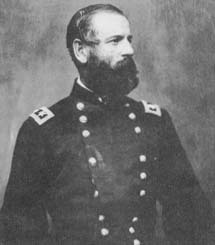Fitz-John Porter Court-Martial: 1862-63
Porter Found Guilty On Key Charges
The court-martial met continuously for 45 days. A large number of officers testified, including General Pope, both against Porter and on his behalf. At the end of the session General Porter submitted a lengthy statement summarizing his defense. The core of his argument was that it is well established in military law and practice that an order does not require passive obedience unless the commander and the officer ordered are physically together; in this case General Pope was 11 miles away from Porter, and the orders took several hours to reach him. Pope was not aware of the military situation that Porter confronted when he received the orders, and therefore he (Porter) used 'judicious discretion" in attempting to carry them out. He did not dispute that he had delayed the start of his march until 3 A.M., but argued that his men were exhausted from the previous day's march and needed rest. Also it was extraordinarily difficult to move wagons and artillery pieces on muddy roads on a very dark night. To the more serious charge of failing to attack the enemy's rear and flank, Porter emphasized that when he sent the order General Pope did not know that Longstreet's line had linked up with Jackson's. Porter's march did not bring him upon the rear and right flank of Jackson's forces, but upon the front of Longstreet's, making it impossible to carry out the order. To have attempted an attack upon the combined forces would have risked the destruction of his, and a worse defeat for the entire Union army under General Pope.
 Major General Fitz-John Porter, court-martialed after the defeat of the Union troops at the Battle of Bull Run.
Major General Fitz-John Porter, court-martialed after the defeat of the Union troops at the Battle of Bull Run.
The court delivered its verdict on January 10, 1863. Although found "Not Guilty" on the 4 and 5 specifications of the first charge, which pertained to allowing one of his brigades to march to Centreville on August 30, Porter was declared "Guilty" of the major charges of disobedience and misbehavior. The sentence of the court was that he "be cashiered … and forever disqualified from holding any office of trust or profit under the Government of the United States." The proceedings, findings, and sentence were transmitted to President Lincoln, who approved and confirmed them on January 21.
In his defense General Porter indicated the political nature of the proceedings by referring to General Pope's change of mind after his meeting with the president. Historians have also pointed out that the officers for the court were carefully selected by Secretary of War Edwin Stanton, and many received promotions after reaching their verdict. Fitz-John Porter immediately set out to clear his name, a task which he pursued assiduously for years. In 1878 a board of general officers reviewed the case and reported in Fitz-John Porter's favor, agreeing with his argument that to have attempted an attack would have been wrong. In 1881 Chester Arthur succeeded to the presidency following the assassination of James A. Garfield, who, as a young brigadier, had served on Fitz-John Porter's court-martial. In 1882 President Arthur remitted that part of Porter's sentence which disqualified him from holding office under the United States. In 1886, by a special act of Congress, he was recommissioned as a colonel in the artillery, to date from May 14, 1861. Although back pay was denied, Porter considered this a vindication, and retired at his own request two days later.
—David I. Petts
Suggestions for Further Reading
Hattaway, Herman, and Archer Jones. How the North Won: A Military History of the Civil War.Champagne, Ill.: University of Illinois Press, 1983.
Official Records, Series I, Volume XII, Part II, Supplement (Eisenschiml, Otto, The Celbrated Case of Fitz-John Porter)
Additional topics
- Fitz-John Porter Court-Martial: 1862-63 - Court-martial Follows Lincoln—pope Meeting
- Other Free Encyclopedias
Law Library - American Law and Legal InformationNotable Trials and Court Cases - 1833 to 1882Fitz-John Porter Court-Martial: 1862-63 - Porter's Retreat At Second Manassas, Court-martial Follows Lincoln—pope Meeting, Porter Found Guilty On Key Charges